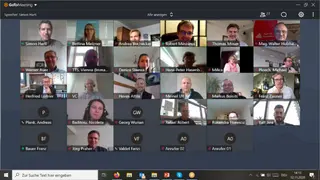The right chemistry for Danube navigation? On the 12 November 2020 27 participants took part for the first time in a virtual workshop to discuss the opportunities and potentials offered by using inland waterway transport of mineral oil products, fertilizers etc. Three experts from OMV AG, the port of Giurgiulesti and TTS Austria provided insights in their logistical processes and highlighted the current and long-term challenges concerning the transport of their (petro) chemical products.
In total chemical and petrochemical products like mineral oil and its derivates, fertilizers, coal and other chemical products count more than 25% of all goods transported on the Austrian stretch of the Danube. Concerning the mineral oil sector, the supply reliability is of utmost importance. Several OMV subsidiaries and depots are located along the Danube, as Mr. Vladimir Cernek in charge for primary logistics, reported. Thus, inland navigation is a very safe, well planable and fast way of transportation, especially when considering the great amounts which are transported.
As Thomas Moser from the Port of Giurgiulesti explained that the mayor amount of goods transhipped are agricultural bulk products. Additional high volumes of mineral oil are delivered via sea vessels, as Giurgiulesti is located on the maritime part of the Danube. A new oil mill has settled down recently in the port and besides vegetable oils also liquid fertilizer and ethanol has been transhipped recently.
Exciting impressions on future developments concerning fertilizers were presented by Herfried Leitner from TTS Austria. Especially in South-East-Europe the demand in the upcoming years will increase, only phosphate fertiliser will face a decline. Other fertilizer products will rise in this region and will offer future potential for inland navigation. The company TTS operates 55 pushers and around 450 barges. Additionally, other services are offered within the group such as operation of terminals for transhipment, a shipbuilding yard and bunker facilities.
The current crisis is taking their tolls but the supply reliability plays a central role especially today. Future changes in the transported cargo like e.g. decrease of fossil fuel and yearly changes in agricultural cargo flows, also influence the Danube Navigation sector. On the maritime Danube, the increase of lot sizes using sea vessels can help to optimise cost. On the Upper and Middle Danube more often, multimodal concepts are used as smaller lots for chemical products are getting in focus.
Inland navigation contributes to an environmentally friendly transport system, its markets players like shipping companies, ports and cargo owners should act as a jointly to represent interests of the sector a to show the advantages and opportunities in the competition with other transport modes.
The initiative of chemical and petrochemical products will be accomplished at the end of this year. In total, three expert workshops showed the opportunities and potentials of the different cargo types. Additionally, an information brochure in German and a dedicated website display all necessary inputs on inland navigation.

